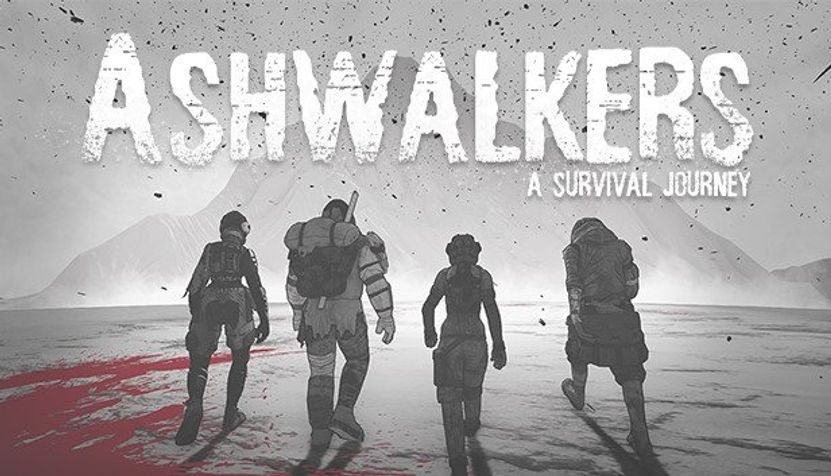Ashwalkers
Ashwalkers is billed on Steam as being both a survival game and a choices matter game. I love survival games as a genre, and choices matter as an element is something I always enjoy. By all rights, I should have loved this game. Except…I didn’t. I gave it two playthroughs (technically three, but I’ll get to that), and each time, I felt like I was going through the motions both of a survival game and of a choices matter game without feeling the heart of either. To really understand why Ashwalkers doesn’t succeed at either, I want to go into depth about both genres and understand what I love that isn’t in Ashwalkers.
But first! Let’s talk about Ashwalkers and what it is before diving into what it isn’t. Ashwalkers is a survival/adventure/exploration game about a group of scouts searching for a new home in the post-apocalyptic wastelands. In the wilderness, they face ferocious beasts, “savage” humans, and the elements as they strive to save their people. Your party explores a linear path, collecting resources along the way, camping and exploring, and making decisions about their interactions along the way. It’s a straightforward game with elements very familiar to anyone even slightly familiar with survival games, but with the added twist of moral dilemmas along the way.
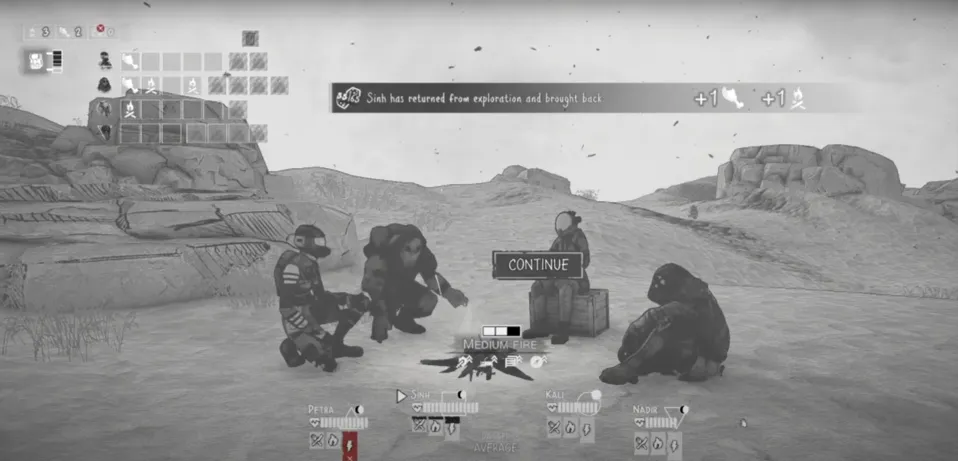 And camping! Everyone loves camping.
And camping! Everyone loves camping.
Playing Ashwalkers and slogging down the linear path got me thinking about survival games and what makes a good survival game. I’ve talked about escapism and how games allow us to experience something outside our normal reality . With survival games, I’m looking for a very specific experience; I want to feel on the edge of doom. I want to look at my supplies, say “I shouldn’t have looked at that,” then press on anyway because there is no better option. The ideal survival game skirts the edge of impossible while still providing the glimmer of hope that you can make it through. There needs to be the knowledge that the sacrifices made along the way are worth it, that you (and/or your companions) will make it.
Ashwalkers doesn’t have that. A huge part of why is that I’m not sure Ashwalkers understands the “survival” part of a survival game.
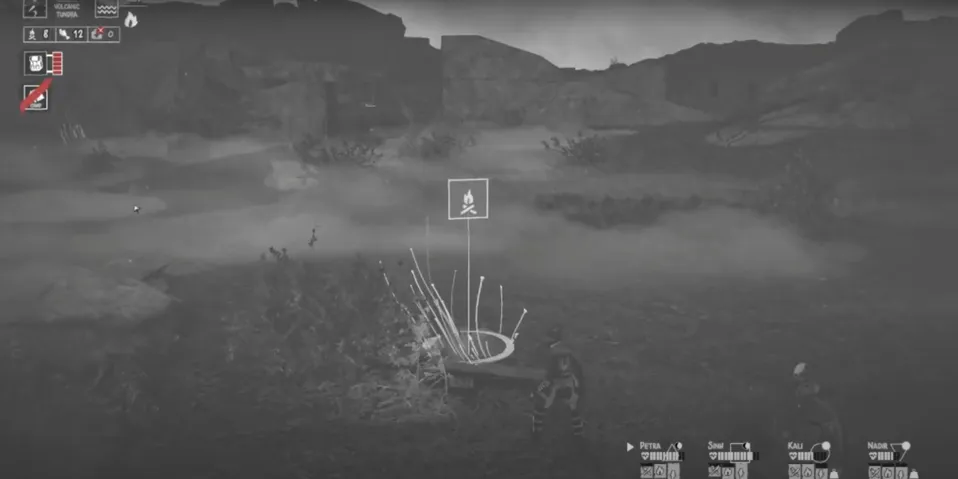 Pictured: An over-encumbered party encounters yet more supplies
Pictured: An over-encumbered party encounters yet more supplies
Fundamental to a survival game is the edge-of-your-seat sensation of making do with not enough. In Ashwalkers, I never had a moment where there wasn’t enough. My party was overwhelmed with supplies, more often than not, and would camp next to a resource spot whether they really needed to camp or not, just to clear inventory space. Rather than having to weigh the pros and cons of starvation, my party stayed happy and healthy the whole way to their destination.
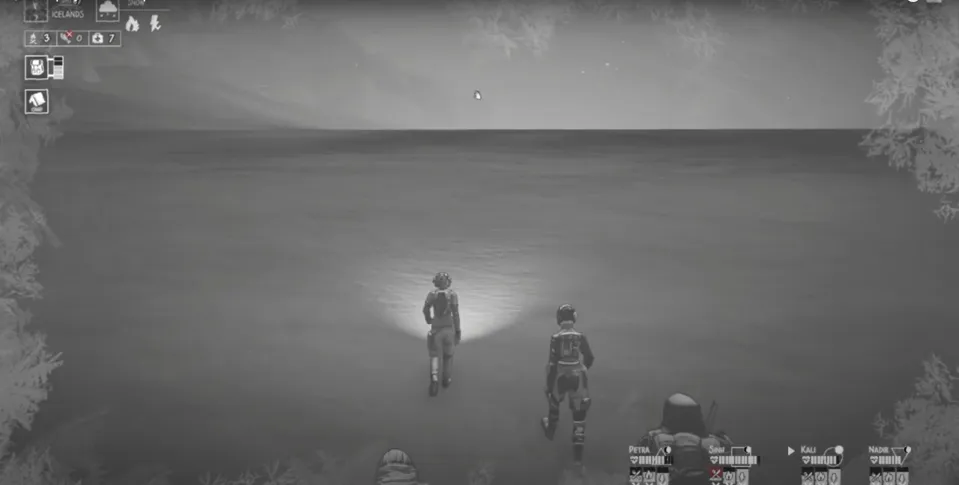 Pictured: The end of the earth. Not pictured: Worry
Pictured: The end of the earth. Not pictured: Worry
On my second playthrough, I intentionally stopped camping at the resources and altered my playstyle to take more risk and put the squad in danger. I didn’t lose a single person, and once again, completed the mission, finding and conquering a lovely-looking oasis. On that playthrough, I may have broken the game by realising wood and food aren’t necessary resources - because running out of food and heat deducts from health, it’s easier to carry the absolute bare minimum of food and wood and stop once a level, just to apply medpacks to anyone who is starving to death. There was no sense of panic or concern, even when I was aiming for it, no worry that I wouldn’t make it. The world is flush with resources - all I have to do is eat enough band-aids to get there. Without that sense of tension, there has to be something more keeping the player invested in the game. Managing needs bars isn’t survival - it’s a mechanic. The art and the music are gorgeous, but, like AER , if they’re stripped away to show nothing of substance behind them, the game can’t succeed.
Ashwalkers doesn’t just bill itself as survival. It is a game where choices ostensibly matter, where the decisions that are made along the way are meant to be meaningful moral dilemmas that impact the game. The game has choices, in spades, though whether they’re meaningful or meaningfully impact the game is debatable.
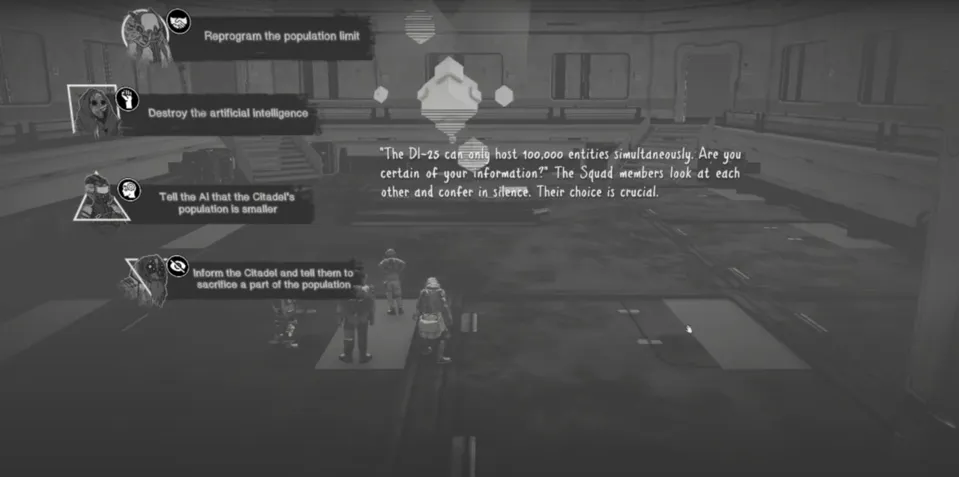 This is the most difficult choice of the game, and it is the last choice the players make.
This is the most difficult choice of the game, and it is the last choice the players make.
Ashwalkers’ choice system is less a system of moral dilemmas, and more a system of strategy decisions. Each choice has a particular alignment (diplomatic, tactical, sneaky, or PUNCH), and represents a strategy for approaching the problem.
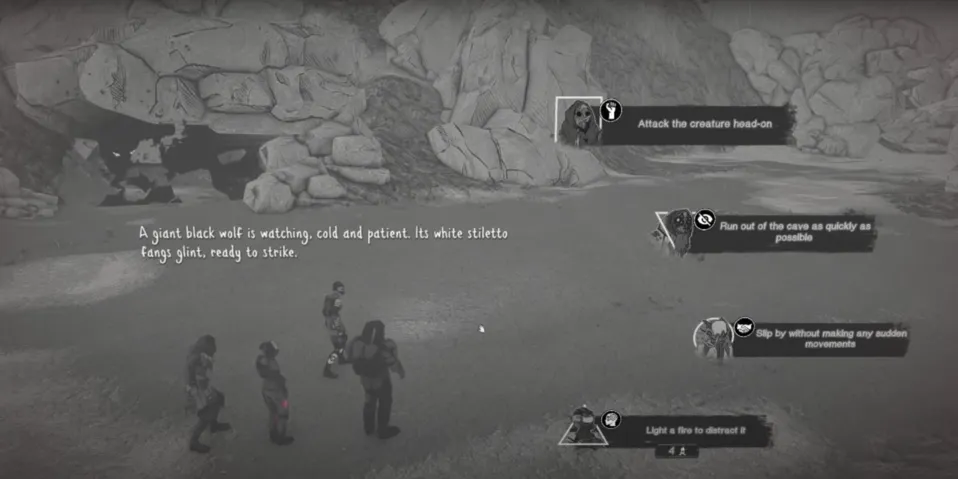 I’m pretty sure that last option is just there for pyromaniacs.
I’m pretty sure that last option is just there for pyromaniacs.
A player can choose whichever option, but the end result will be the same - they will make it past the obstacle. How they make it past the obstacle may vary, and the state they’re in may vary, but that they make it past the obstacle is never in question. There isn’t a way to choose an untenable path. There’s nothing that will force you to turn around and try another way. The path is linear, and these choices are set dressing on that straight arrow path.
Where the choices do matter is in the squad’s attitude. At the end of each chapter, the squad’s attitude shifts, depending on which option the player chose most often.
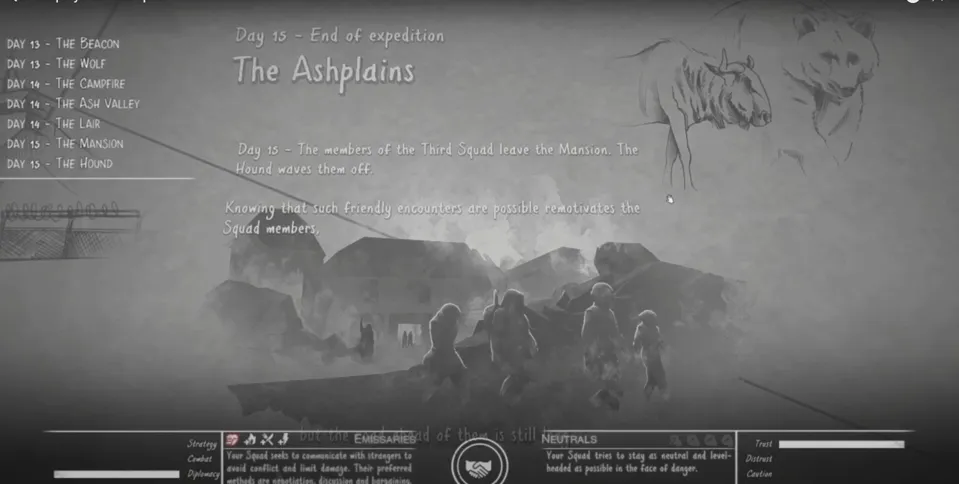 Being friendly makes us weak! :D
Being friendly makes us weak! :D
This mechanic means that choices matter, but in the same way choosing a perk when leveling in an RPG matters - they are fundamentally strategic, not moral decisions. They have no weight behind them, beyond how the party’s build changes. The player will make it to the end regardless of what they choose, and all that really changes is the build they use to get there. It also means the game’s replayability is questionable. I gave the game three playthroughs, and with two, I had the same adventure. I encountered the same monsters, faced the same choices, and found that nothing fundamentally changed. I picked the violent psychopath route for the second playthrough, and made it just fine to the end. The choices I make along the way only really impact my build, which achievement I’ll get, and what label gets added to the big ending book. It’s a game that wants to be replayable, but the only motivating factor is to put a different label on the same ending. The steps to get there will always be the same; the only change is whether it’s a punch or a handshake that gets you there.
There are games where choices work and make the gameplay experience meaningfully different. The Geneforge series is an excellent example, as is Fallout: New Vegas (both of which we will get to in this series). There, the choices the player makes change and reshape the world, locking certain paths while opening others. Replayability comes from wanting to see the closed paths, wanting to understand how actions shape the world, and wanting to see what it’s like to approach the world in a new way. Fundamentally, though, in games where choices matter, the player is a disruptor, a force coming into an existing plot and reshaping it in unknown ways. It’s in the chaos that the ripple effects of our choices become apparent. In games where the world revolve around the player character, though - in games where the ideal ending is “we succeed in our goal” and it’s clear what the goal is - choices can never really matter. Our goal as a player is to succeed in our character’s goal, and the game is written in such a way as to facilitate that. Choices fundamentally do not matter in Ashwalkers because the player is not a disruptor. The player is on a mission to save their people, and that is what they will do.
The one exception to this idea is 80 Days . The difference with 80 Days is that choices are the entire game. There are light touches of other mechanics, but the entire point of 80 Days - and what makes it compelling - is that it is a game about making choices. It doesn’t split its time with a genre where choices are a luxury, and that’s why it succeeds.
At its core, Ashwalkers does not succeed at what it’s trying to be. As a survival game, it’s too easy to have tension. As a choice, story game, its choices don’t mean anything beyond which ending screen the player gets. As a journey game, it has a journey, but it’s always the same one. Always the same obstacles, in the same order. Trying to create a different path doesn’t yield a new story - just a jump in the only one the game has.
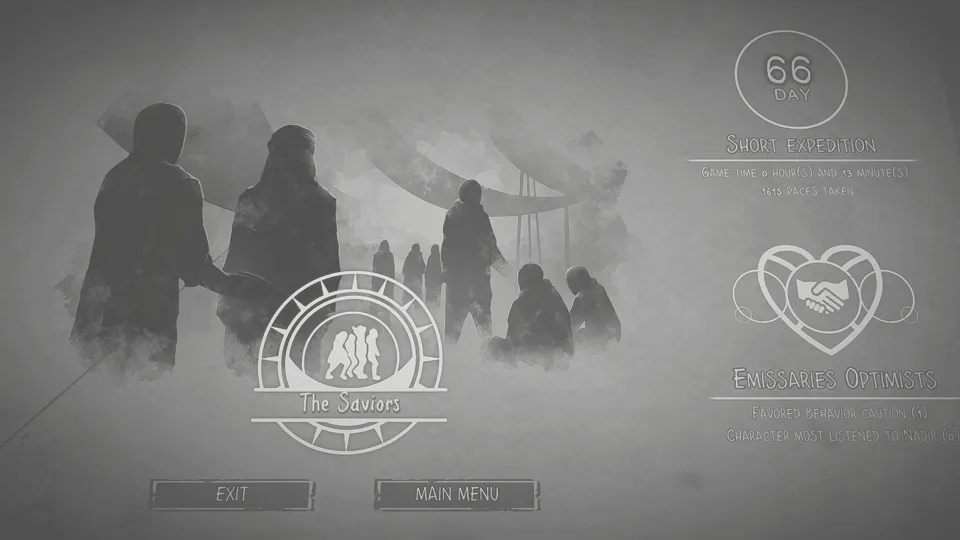 This was my third playthrough.
This was my third playthrough.
This is the final nail in the game’s coffin. In my third playthrough, I wanted to see if starting the game at a different location meant a different story. All that happened was that I skipped to the end of the existing story, and could pick the ending I wanted to see. When the game itself offers you the way to skip most of its content, that shows that the choices made along the way don’t matter. The game knows that the only reason to play again is to get a different ending, and it offers a shortcut to do it.
I wanted to like Ashwalkers. I got really excited when I got it, and was excited about its atmosphere, world, music, and art, even as it started to kick in that gameplay wasn’t there. I gave the game three playthroughs, trying to find the game I thought it could be. That game is not there. Ashwalkers is good for a playthrough, but with the understanding that it is a walking simulator with needs bars. It’s more closely related to Death Stranding than anything - a game about walking through a post-apocalyptic world and having encounters, but one where, fundamentally, what you do changes nothing.
Developer: Nameless Xiii
Genre: Survival, Adventure
Year: 2021
Country: France
Language: English
Play Time: 2 Hours Per Playthrough
